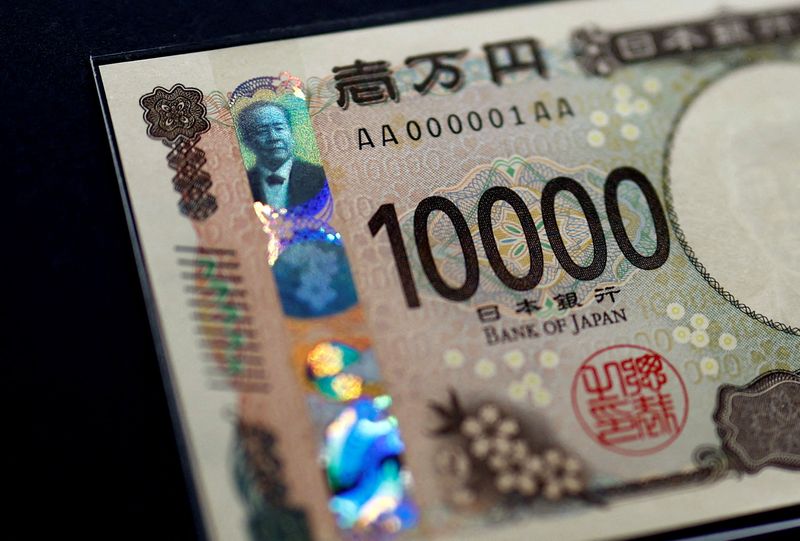By Jamie McGeever
ORLANDO, Florida (Reuters) -By one measure, the speculative Japanese yen-funded carry trade has been completely unwound.
The latest Commodity Futures Trading Commission data show that hedge funds and speculators have flipped their long-standing short yen position and are now net long of the currency for the first time since March, 2021.
It may have taken a lot in recent weeks to prompt the turn - a hawkish Japanese rate hike, yen-buying intervention and a burst of safe-haven demand amid the historic spike in U.S. stock market volatility early this month - but the flip was quick.
Data for the week ending August 13 show that funds held a net long position of just over 23,000 contracts, effectively a bullish bet on the currency worth $2 billion.
Just seven weeks ago they were net short to the tune of 184,000 contracts. That was their biggest short position in 17 years, a $14 billion bet against the currency. The scale and speed of the bullish momentum shift in July and so far this month is historic.
A short position is essentially a bet that an asset will fall in value, and a long position is a wager its price will rise.
As analysts at Rabobank point out the yen was the best-performing G10 currency against the dollar in July, rising more than 7%. But it has begun to ease lower again as the vol shock of August 5 fades and investors recover their appetite for risk.
The question now is whether CFTC funds and speculators more broadly are inclined to go back into yen-funded carry trades or not. There are persuading arguments on both sides.
The bar to extending long yen positions and for further yen appreciation may be higher. The U.S. economy is still growing at a decent clip - a 2% annualized rate, according to the Atlanta Fed GDPNow model's latest estimate - and the dollar's interest rate and yield advantage over the yen remains substantial.
The yen 'carry' trade - selling the yen to fund the purchase of higher-yielding currencies or assets - is an attractive strategy from a fundamental perspective despite the recent turmoil.
"We still hold the view that it is hard for the Dollar to go down (or to be bullish Yen) substantially or durably in the current environment," FX analysts at Goldman Sachs wrote on Friday.
On the other hand the recent turmoil is not in the rear view mirror completely, and volatility may stay above pre-August 5 levels for some time yet. This is bad for carry trades, which rely on low and stable volatility.
Measures of implied volatility in dollar/yen from one week to six months out are all higher, especially further out the curve. It may take a more meaningful decline in volatility before speculators consider shorting the yen again.
And figures on Friday are expected to show that inflation in Japan climbed to 2.7% last month, the highest since February, likely to keep the Bank of Japan minded to continue tightening policy. All while the Fed is about to start cutting rates.

"While the (U.S-Japanese) rate spread will remain attractive, the danger is that we have entered a period of more sustained volatility that will encourage further liquidation of yen carry positions over the coming months," Morgan Stanley's FX strategy team wrote on Friday.
(The opinions expressed here are those of the author, a columnist for Reuters)
(By Jamie McGeever; Editing by Michael Perry)